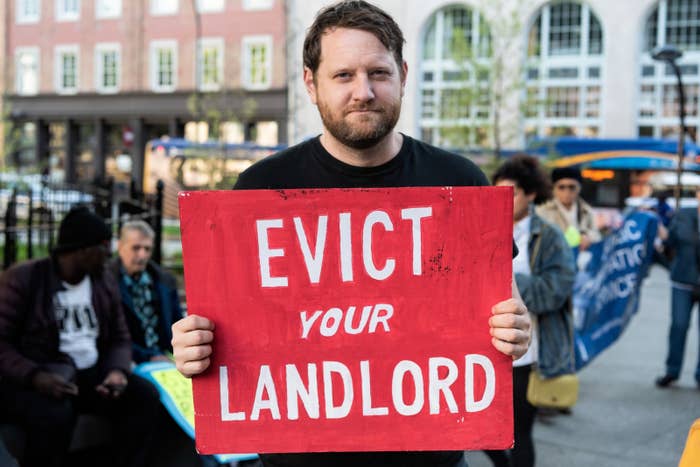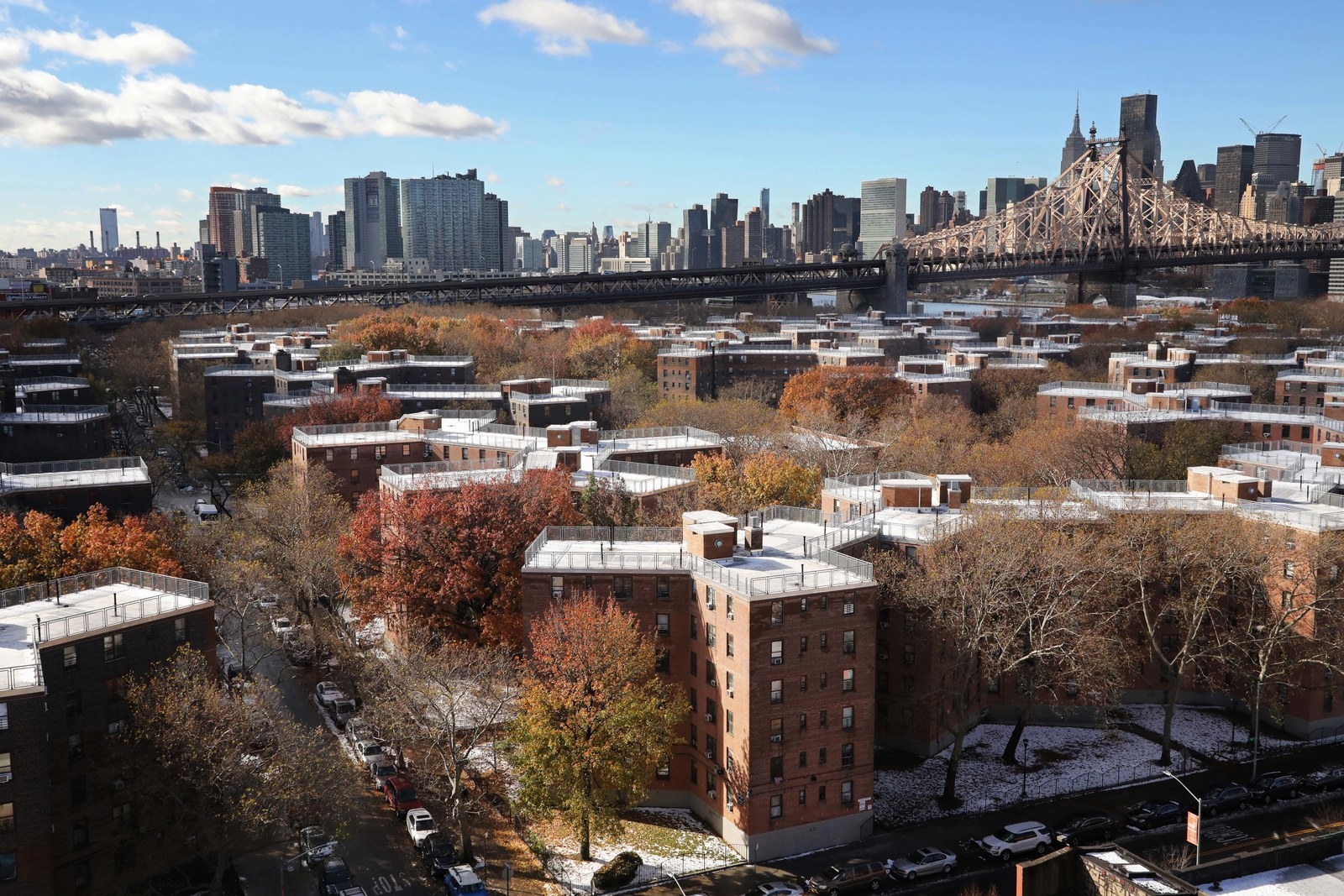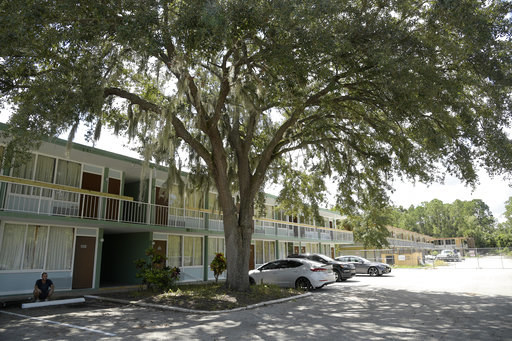
Imagine, for a moment, that you are running for president. You need to rise above an ever-expanding herd of competitors for the Democratic nomination, and then secure 270 electoral votes against Donald Trump. You would, presumably, need an issue that sets you apart.
Imagine, then, that Americans are spending a third of their income on one single thing, with many shelling out half their pay or more for it. Imagine that the cost of this thing rose by 31% in the past decade, rapidly outpacing inflation. Imagine that nearly 21 million families are paying what experts call a “burdensome” share of their income on it. Imagine that failure to afford that thing routinely throws families into homelessness.
If you want to inspire voters to elect you president, wouldn’t you make that extraordinary, crushing expense a cornerstone of your campaign, and go all out to address it?
This is the opportunity staring Democratic presidential candidates in the face on rental housing. Some candidates have already woken up to this opportunity. Others continue to ignore it. None are proposing a bold enough vision — and those who do may gain a serious leg up on their primary opponents, and on Donald Trump.
Democrats need renters to turn out in 2020. If renters had voted at the same rate as homeowners in 2016, Hillary Clinton would have trounced Donald Trump in Wisconsin, Michigan, Pennsylvania, and Florida.
This is not just about political prerogative. Renters are emblematic of Americans abandoned by crony capitalism. Their fates represent the success or failure of the American project in the 21st century. The median renter makes just over $30,000 per year and has one-fiftieth the wealth of the median homeowner. Millions go without transportation, health care, and even food to pay rent. It is an urgent moral crisis.
Progressive presidential candidates must affirm that housing is a right, and strive to make it a reality. Given how many Americans are touched by the housing crisis, big action to address it can be a political winner.
As a courtesy to the presidential candidates — and as a guide to voters who care about housing — Data for Progress has put forward a "Homes for All" plan that offers a comprehensive solution to the housing crisis. And we polled on it, so we know that voters want it.
The Homes for All plan calls for four major reforms: ending racist exclusionary zoning, building 7–10 million affordable homes outside the private market, providing immediate relief and stability for cost-burdened renters, and treating housing as a home instead of an investment. Here's how they would work.
Combat racist zoning policies
With the United States short nearly 9 million homes, any lasting solution to the housing crisis requires building a lot of new places to live.
Unfortunately, much of the country bans lower-cost multifamily housing because Herbert Hoover and a committee of openly white supremacist capitalists created exclusionary zoning, encouraging cities and suburbs to segregate or outright ban buildings that can house many people affordably. This coincided with and reinforced redlining, concentrating poverty and blocking people of color from stable housing and upward mobility. Fast-forward to 2019 and the scarcity created by exclusionary zoning has put tenants of all races at the mercy of their landlords.
The answer to this problem is fairly straightforward — replace exclusionary zoning with equitable zoning, allowing uniquely affordable homes like duplexes, fourplexes, and garden apartments anywhere a single-unit detached house can be built.
Because zoning is up to cities and states, the federal government cannot constitutionally end exclusionary zoning nationwide, but it should tie federal funding to equitable zoning, through new incentive-based funds to cities and states that repeal exclusionary zoning rules and/or withholding highway funding from those that keep them.
Not only would equitable zoning help bring down the cost of housing to affordable levels, but it would also make communities more walkable, bikeable, and transit-friendly. This both appeals to most Americans and is critical to addressing climate change.
Equitable zoning is also popular. New polling from Data for Progress and YouGov Blue finds that voters support ensuring “smaller, lower-cost homes like duplexes, townhouses, and garden apartments can be built in middle- and upper-class neighborhoods” by wide margins — 50% support to 25% oppose.

Build 7–10 million homes outside the private market
Addressing racist zoning policies alone is critically necessary, but not sufficient to house the 7 million American families who are too poor to afford for-profit housing. The next president needs to build enough homes to house all of them through a mix of private or nonprofit affordable homes and new publicly owned homes.
Expanding social housing at this scale means repairing the foundations of American affordable housing. The Low-Income Housing Tax Credit (LIHTC) needs a major renovation. Though responsible for 90% of recent affordable housing construction in the US, it has only averaged 100,000 new affordable homes per year, when the need has been triple that. More problematic still, too many developments concentrate poverty, many are too expensive for the poorest families, and nearly all are eventually eligible to return to market rates after 30 years.
LIHTC developments should be targeted in amenity-rich communities and buildable by-right, not subject to local veto from exclusionary NIMBY (Not in My Backyard) groups. Tax incentives should target 100% permanently affordable units with a majority of housing going to renters making 30% of median income or less. More financing should be provided upfront to cover deep affordability over a 50-year life cycle. By restructuring LIHTC and committing new resources through the National Housing Trust Fund, the nonprofit and private affordable housing sector can create 3.5 million new affordable homes — a serious chunk of the need.
Yet we will never house all Americans without a recommitment to building publicly owned homes.
While racist demagoguery has convinced much of America to fear and hate public housing, observations at home and abroad show it to be a critical to a just housing system. The New York City Housing Authority, despite relentless political attacks, uneven management, and $2.7 billion in cuts since 2001, continues to provide deeply affordable homes for over 500,000 working-class New Yorkers. Industrial nations from Sweden to Austria and Hong Kong show that public housing can thrive when it isn’t starved for funding.
Progressive policymakers should fully fund the 1.2 million existing publicly owned homes in the US, end the Rental Assistance Demonstration program that is slowly privatizing public housing, repeal the Faircloth Amendment that bans new public housing construction, and start building new 3.5–7 million new public homes.
Truly visionary candidates will go beyond the baseline 3.5 million affordable public homes, and follow Vienna’s popular mixed-income social housing model. With an additional 3.5 million “public option” homes for the middle class, income-integrated public housing provides the best possible path out of poverty and a stronger political constituency for lasting social housing.
Voters also deeply support social housing. Our polling showed 60% of those surveyed support building “enough new nonprofit and publicly owned homes to ensure every American has a place to live,” versus just 22% who oppose it.

Give immediate relief to renters
Repealing racist zoning and building millions of new affordable homes will create a just housing system, but those changes take time. We need to get cash into the hands of struggling tenants now to create political breathing room for comprehensive solutions to work and to make life better for renters on the edge.
Paired with equitable zoning and social housing to balance the power dynamic between landlords and tenants, and a low cap on how much any subsidy can grow every year, cash assistance to cost-burdened renters could provide massive relief to tenants while reining in the possibility of runaway costs.
Another swift, if slightly slower, path toward relief for renters would be widespread adoption of rent control or stabilization. The federal government likely cannot do that by fiat, but it should offer carrots (like grants to cities or states) or sticks (like limits on the mortgage interest tax deduction) to compel communities to enact fair, universal rent stabilization measures that set a low ceiling on annual rent increases and ban no-cause evictions.
Rent control efforts are sweeping the nation, with armies of activists fighting to create certainty and affordability for tenants. State governments are paying attention, with Oregon enacting the first statewide cap on rent increases in the nation in February, and other states looking to follow suit. It has generated massive energy, and presidential candidates should work to leverage it.
Rent relief is popular among voters. Rent stabilization is beloved. By a 44%-to-31% margin, voters support spending “$50 billion on rent subsidies to families paying over 30% of their income in rent.” Rent stabilization does even better, with 56% of voters favoring “a policy to cap rent increases to 5% a year,” versus just 21% in opposition.
Make homes for people, not capital
True reform to the American housing system would be incomplete without restoring our commitment to homes as places to live, instead of shelters for capital.
Doing that will take eliminating tax privileges for rental properties, dismantling speculative real estate practices, and encouraging alternative ownership models.
Federal tax subsidies for purchasing, operating, and reselling rental property attracts speculators eager to flip buildings, which raises rents and destabilizes neighborhoods.
Progressives should pare down rental property depreciation to just long-term building improvements or investments in decarbonization. Rent and the sale of the property should be taxed like wages to keep landlords from disproportionately benefiting from the rising property values that stem from public investment and land scarcity, and incentivize holding on to buildings and tenants for longer.
Next, we should end speculation on nonprimary residences by taxing vacant investment properties and luxury secondary homes and ban the purchase of homes by anonymous LLCs. We should also eliminate all tax benefits for homes used for short-term rentals over a minimum of days annually, to curtail the speculative expansion of Airbnb and other similar services that take homes off the rental market.
Most urgently, any progressive should end the Federal Housing Administration’s baffling practice of selling thousands of single-family rentals and backing mortgages and insuring mortgage securities to private equity companies like Blackstone. Instead, we should redirect the FHA to keep families in distressed homes by offering eviction protections and short-term crisis assistance, giving communities a first right of refusal to buy distressed homes, and only work with institutions that commit to alternative equity ownership models or to building permanently affordable housing.
To embrace homeownership without speculation, progressive candidates should embrace shared equity models that value community stability, permanent affordability, and democratic decision-making, like cooperative housing and community land trusts. That means financing construction, rehabilitation, and conversion to these models; offering educational and logistical resources; and assisting with land costs for nonprofits dedicated to shared equity homeownership. Because shared equity serves a beautifully diverse population, ranging from Houston’s municipal land trust in the historically black, displacement-vulnerable Third Ward, to rural mobile home co-ops, it can be a unifying and uniquely American solution.

Any candidate running on rental housing will have a leg up. More Americans rent their homes than at any time since 1965. It is a huge potential voting bloc. The strongest candidates will know how to talk about stable, affordable rental housing.
They will speak in moral terms — the millions of families lifted out of poverty and into the middle class. They will speak in economic justice terms — working people given a fair shot at negotiating with a bad landlord. They will speak in racial justice terms — righting the wrongs of prior generations and giving people of color a fair chance at the American dream. They will talk about rental housing as a matter of environmental justice: promoting dense, walkable communities that reduce carbon emissions. And they will talk about it in terms of the quality of life for homeowners — millions of fewer people living on the street, less property crime, and more stable families in every neighborhood.
Stable, affordable rental housing is a win for every American. It will be a winner for the candidate who seizes the opportunity and proposals a real, full fix. The door is open.
Henry Kraemer is a housing fellow for Data for Progress and an activist focused on social democratic urbanism and voting rights.
Peter Harrison is the senior housing adviser for Data for Progress and a professor at Baruch College.

